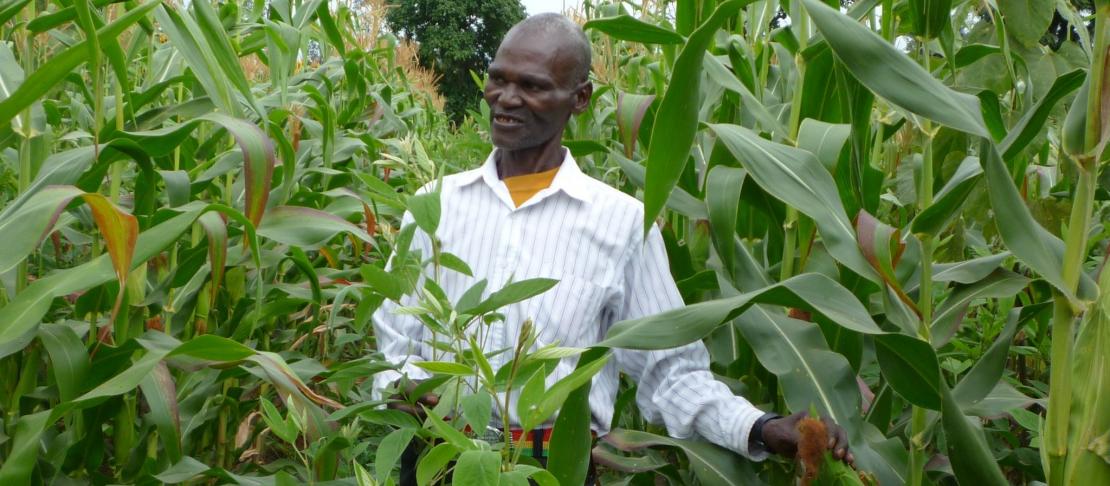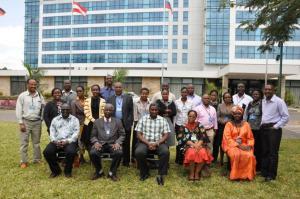Bridging the research and policy gap through partnerships

by Tabitha Muchaba, Catherine Mungai, Maren Radeny and Olive Thiong’o
In order to build capacity for evidence-informed policymaking and enhance science to policy dialogue, the CGIAR Research Program on Climate Change, Agriculture and Food Security (CCAFS) East Africa program hosted the second workshop of the Regional Learning Partnership (RLP) in June, 2012 in Arusha, Tanzania.
Launched in April 2011, the RLP is a pathway for policy engagement from local to regional scales and brings together 16 African organizations in agriculture, climate change and food security from Southern and Eastern Africa. The workshop brought together over 20 participants from regional economic and inter-governmental organizations, research institutions, universities, NGOs, farmer organizations, and the private sector to define key national, regional and international outputs and outcomes for 2013.

Discussions over the two days of the workshop focused on four key areas: identifying the unique value of the RLP and developing a strategy over the next two years to bridge the research and policy gap, defining outcome targets for 2013 at different scales, including strategies for achieving the outcomes, defining RLP communication tools and themes for policy briefs for key regional meetings and targeted end users, and developing an engagement strategy to raise the profile of sustainable agriculture at the 18th Conference of the Parties (COP18).
The outcome mapping approach was used to define the outcome targets at different scales and to develop an operational plan and strategies for supporting the outcomes. Three outcomes were defined at the international scale:
- A unified African position for a work program for Agriculture at COP18 by SADC, EAC and COMESA
- Use of scientific evidence by the Africa group of negotiators to articulate and negotiate in a unified manner, supported by a technical team to synthesize and package scientific evidence
- COMESA and SADC to work with other Africa regional groups to present an Africa position
To support the international outcomes, the RLP organized a side event at the African Ministerial Conference on Environment (AMCEN). Additionally, RLP will organize exhibitions at the second annual Climate Change and Development in Africa (CCDA) conference and explore other forums for bringing together regional governmental organizations such as Common Market for Eastern and Southern Africa (COMESA), East African Community (EAC), Southern African Development Community (SADC) and The Intergovernmental Authority on Development (IGAD).
The regional outcomes were similar to the international outcomes. A major difference was for strong Africa countries’ to present continental interests while taking into account the interests of individual countries. Proposed strategies for supporting the regional outcomes included a synthesis report on NAMAS to identify gaps and make recommendations, convening a regional forum to inform a unified Africa position for an agriculture work program in COP18, the UNFCCC climate change meeting in Doha later this year, analysis of the various positions (submissions by parties) to identify divergences and convergences, supporting evidence generation by RLP partners, organizing forums at the regional level, and documenting case studies of agriculture and mitigation.
At the national scale, participants identified four outcomes:
- Inadequately represented countries able to develop and articulate their interests
- Strong countries (agree) to present continental interests
- Strong countries build the capacity and mentor ‘weaker’ countries
- Individual countries have their own supporting evidence and position.
Among the strategies identified for supporting national outcomes included consolidating lessons into clear evidence, facilitating information sharing, analysis of strong and weak countries and influencing factors, facilitating resource mobilization to technical teams within countries, identifying capacity building needs and building the negotiating capacities of ‘weak countries’.
With regard to communication for supporting decision making on climate change, agriculture and food security, participants identified specific themes for policy briefs, key case studies and essays on adaption and mitigation actions in agriculture. Various communication approaches such as media, establishment of knowledge centers, ICTS, side events at major conferences will be explored. Through continuous engagement of key policy and research organizations and integrating a diversity of experience and expertise, the RLP will work towards concrete outputs in preparation for COP 18 and 2013.
On the next steps, a monitoring framework will be put in place to monitor progress towards achieving the outcomes, identify gaps and challenges. To ensure continuity of the RLP, internal communication approaches were identified. These included web based communication channels (e.g. websites, email, Wiki, Skype and Drop Box), thematic working groups, bi-annual face-to-face meetings; and invitations to farmers’ events. CCAFS East Africa will continue to host and coordinate activities of the RLP.
This blog post was written by Tabitha Muchaba, Catherine Mungai, Maren Radeny and Olive Thiong’o, all integral staff members of the CCAFS East Africa Program. You can now follow the East Africa program on Twitter: @cgiarclimate_EA